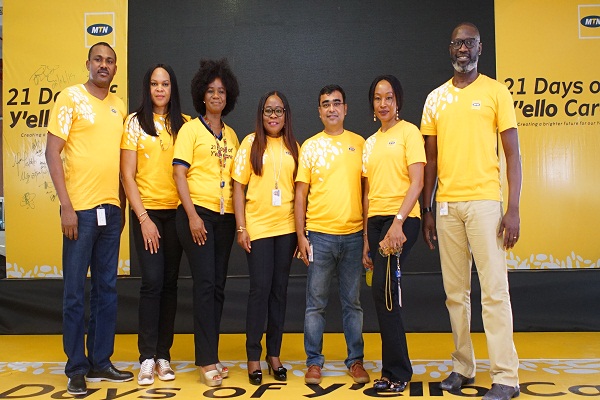Telecom
NDPC Announces Date for Launch of National Privacy and Digital Awareness Campaign

In a bid to uphold the principles outlined in the Nigeria Data Protection Act (NDPA), 2023, Dr. Vincent Olatunji, the National Commissioner/CEO of the Nigeria Data Protection Commission (NDPC), is set to introduce the pre-inaugural National Privacy and Digital Awareness Campaign on Thursday, March 21 in Lagos.

Spearheaded by the Nigerian Stakeholders for Data Protection Awareness (NSDPA), this initiative aims to educate Nigerian citizens, businesses, and organizations about the crucial importance of safeguarding personal data and privacy in the digital realm.
The primary objective of the campaign is to raise awareness on the significance of data protection and privacy, not only to foster a secure digital environment but also to stimulate job opportunities across Nigeria.
By empowering thousands of Nigerians to contribute their creativity to the campaign, the NSDPA seeks to deepen the value proposition of the National Awareness Campaign while simultaneously addressing critical issues in data protection.
Comprising seasoned professionals from various sectors, the NSDPA is united in its mission to promote strategic awareness regarding data protection and privacy throughout Nigeria.
Recognizing the pivotal role of such awareness in nurturing a robust digital economy, the campaign aims to reach citizens across all six geo-political zones of Nigeria, including:
North West: Kaduna, Kano, Katsina, Sokoto, Dutse, Birni Kebbi, Gusau
North East: Maiduguri, Yola, Gombe, Jalingo, Bauchi, Damaturu
North Central: Jos, Makurdi, Lafia, Ilorin, Minna
South West: Lagos, Ibadan, Ogun, Akure, Ado-Ekiti, Oshogbo
South East: Enugu, Owerri, Abakaliki, Awka, Umuahia
South South: Port Harcourt, Calabar, Uyo, Yenagoa, Benin, Asaba
The National Privacy and Digital Awareness Campaign, set to utilize extensive media resources, is a collaborative effort between the NSDPA and the NDPC.
Its overarching aim is to assist the NDPC in achieving its strategic mandate of fostering a National Culture of Data Protection Awareness, aligning with the provisions outlined in the Nigeria Data Protection Act.
Through this campaign, Nigeria endeavors to create a safer and more secure digital environment while empowering its citizens with the knowledge and skills necessary to protect their personal data.
Telecom
MTN, Meta Partner to Enhance Voice and Video Calling Quality

MTN Group, Africa’s leading telecommunications provider, has joined forces with Meta to improve the quality and reliability of voice and video calls on real-time calling applications such as WhatsApp across 12 MTN markets.

The collaboration, which began at the Mobile World Congress (MWC) 2024, focuses on optimizing application-aware networks and network-aware applications to deliver a seamless and high-quality user experience. By leveraging data analytics and conducting comprehensive testing, MTN and Meta have successfully developed solutions that enhance the interaction between mobile networks and real-time calling applications.
Nigeria, MTN’s largest market, was the first to implement these enhancements. Early results indicate a remarkable 50% improvement in key performance indicators (KPIs), significantly enhancing the user experience for MTN Nigeria mobile users.
“This implementation further demonstrates our commitment to enhancing our customers’ digital experience.
“We’re pleased with the remarkable improvement in our real-time communication services, reflecting our commitment to innovative customer solutions,” said Yahaya Ibrahim, Chief Technology Officer (CTO) at MTN Nigeria.
Diego Marí, Head of Network Ecosystems Engineering at Meta, added, “The collaboration allows us to deploy advanced solutions for an unparalleled real-time experience in Nigeria and showcases our dedication to elevating service quality and improving user experience, while striving for continued efficiency in traffic delivery.”
The partnership underscores MTN and Meta’s shared vision of delivering cutting-edge solutions to enhance digital communication across Africa.
Telecom
MTN Plans Second Public Offer in Nigeria

Ralph Mupita, president,MTN Group, has announced plans to reduce its shareholding in MTN Nigeria through a public offer after it returns to profitability.

The group aims to cut its stake from 76 percent to 65 percent in line with its longstanding commitment to deepen local ownership, according to ITWeb, South African tech publication.
Mupita, who disclosed the plan during an editors’ roundtable meeting this week, said “The only localisation we have as MTN Group is we have potentially a sell-down in Nigeria at some point in time, approximately 11 percent. This is something we have said long ago, that over time, we would want more Nigerians owning the company, and we are prepared to sell down to 65 percent. We are at around 76 percent,” he said.
The anticipated offer would mark MTN’s second major retail public offering in Nigeria, following its 2021 sale of 575 million MTN Nigeria shares to local investors.
That offer was oversubscribed, resulting in the allocation of 661.25 million shares, including a 15 percent greenshoe option. This reduced MTN’s stake in its Nigerian unit to 75.6 percent from 78.8 percent.
More than 126,000 investors participated in that round, including retail and institutional investors such as Nigerian pension funds, representing approximately 6.5 million contributors.
At the time in 2022, MTN Group announced plans to further reduce its stake to approximately 65 percent from 75.6 percent.
Mupita confirmed that the Group would only proceed with a new offer once MTN Nigeria resolves its negative equity position and resumes dividend payments.
Currently, MTN Nigeria’s shares are trading at N235 per share.
Despite reporting a revenue of N3.36 trillion in 2024, a 36.03 percent bump from N2.47 trillion in 2023, it posted a loss after tax of N400.44 billion, a 192.25 percent rise from N137.02 billion in 2023.,
This negative performance was driven by macroeconomic headwinds, including record inflation and a steep devaluation of the naira, which raised operating costs and wiped out investor value.
MTN Nigeria has fallen behind MTN South Africa as MTN Group’s largest revenue contributor.
However, the Group is projecting a rebound in 2025, citing key drivers such as recent tariff adjustments, operational restructuring, and improving macroeconomic indicators in Nigeria.
Speaking at the roundtable, Mupita highlighted that the Group is anticipating a V-shaped recovery in Nigeria’s service revenue. He pointed to the recent structural reforms, such as the removal of fuel subsidies, the naira stabilisation, and improved dollar availability.
“The continued normalisation of these factors, particularly naira stability, should have positive impacts on consumer spending power and our business operations,” Mupita noted in the Group’s financial statement for 2024 recently.
Telecom
MTN Staff Commission New Set of Classrooms at Iwerekun Community High School

In a remarkable demonstration of corporate volunteerism, MTN staff, through the Y’ello Care initiative, have renovated a school block at Iwerekun Community Senior High School, Lakowe. This effort has restored hope and significantly improved learning conditions for both students and teachers.

The project, led by dedicated MTN employees, is part of the annual Y’ello Care campaign, which focuses on empowering communities through education, digital inclusion, and economic support.
Prior to the renovation, students at Iwerekun Community Senior High School faced challenges, including deteriorating classrooms that hindered effective learning. Recognising the need for intervention, MTN staff stepped in to transform the learning space, creating a safe, conducive, and inspiring environment for both students and teachers.
At the commissioning ceremony, Honourable Jamiu Tolani Alli-Balogun, Commissioner of the Lagos State Ministry of Basic and Secondary Education, acknowledged the significance of MTN’s contribution to education: “The education sector worldwide thrives on collaboration and commitment between public and private partners. MTN’s generous contribution is truly recognised, and I express my deepest gratitude for its unwavering commitment to supporting education in Lagos State. This new facility will provide a conducive environment for teaching and learning, enabling our students to reach their full potential.”
Representing the Ojomu of Lakowe, Prince Mukaila Adeola expressed the community’s gratitude: “This is a rare opportunity, and it is not every day that Lakowe benefits from such support. We truly appreciate MTN for this contribution, and we look forward to even more support in the future.”
The renovated school block is equipped with improved water supply and an inverter included in a serene environment that enhances the learning experience. This renovation will ensure that students and teachers have a more comfortable and sustainable academic setting.
Speaking on the significance of the project, Tobe Okigbo, Chief Corporate Services and Sustainability Officer (CCSSO) at MTN Nigeria, emphasised the personal investment of MTN staff: “I want to emphasise that this commissioning was made possible by the dedicated staff of MTN. Although MTN has a Foundation funded by 1% of the company’s annual profits, the credit for this commissioning goes to the MTN Nigeria staff members who, through their personal contributions, made this happen.”
Beyond the fresh coat of paint and structural improvements, initiatives like this create a lasting impact and a sense of hope in the lives of the students. The addition of a reliable power source and water facility means that students no longer have to struggle with poor infrastructure, allowing them to focus on their education.
For many students, access to quality education remains a challenge—not just because of financial barriers but also due to poor infrastructure, lack of resources, and limited teacher support. Programmes like Y’ello Care, alongside other education-focused volunteer initiatives, are helping to fill these gaps by creating safe, well-equipped learning environments and equipping students with knowledge beyond the classroom.
With the successful completion of the Lakowe school project, MTN reaffirms its commitment to education and youth development. The company encourages more organisations to embrace volunteerism and community service, as collective action remains a powerful force for societal progress.

 E-Business1 day ago
E-Business1 day agoNITDA Warns Against Fake Google Play Store

 News1 day ago
News1 day agoNOA Uncovers Fraud by Banks, Universities in Students Loan Scheme

 E-Financial1 day ago
E-Financial1 day agoAfrica Loses $88.6Bn Yearly to Corruption- ECOWAS

 E-Financial1 day ago
E-Financial1 day agoUBA Redefines Banking with Next-Gen PoS Terminals and Revamped MONI App

 General News1 day ago
General News1 day agoLagos Commences Integration of NIN with State Single Social Register

 E-Financial1 day ago
E-Financial1 day agoNIBSS Heads to Court to Recover N4Bn Lost due to System Glitch

 E-Financial1 day ago
E-Financial1 day agoSEC Bans Unregistered Digital Asset Exchanges, Online Forex Platforms

 General News1 day ago
General News1 day agoNigeria Records $6.83Bn Balance of Payments Surplus in 2024 Amid Economic Reforms



























